As 2016 beckons, we look at the most popular reviews of 2015 on LSE Review of Books.
 Image Credit: Bratislava New Year Fireworks (Ondrejk)
Image Credit: Bratislava New Year Fireworks (Ondrejk)
Most Read of 2015:
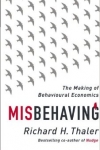 Misbehaving: The Making of Behavioural Economics. Richard H. Thaler. Penguin Random House. 2015.
Misbehaving: The Making of Behavioural Economics. Richard H. Thaler. Penguin Random House. 2015.
While this book covers the core concepts of behavioural economics, Adam Oliver finds that it is more of a ‘personal intellectual history, supplemented by stories, anecdotes and occasional reposts to past combatants’ , thereby missing important issues regarding the future of behavioural economics.
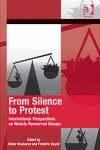 From Silence to Protest: International Perspectives on Weakly Resourced Groups. Didier Chabanet and Frédéric Royall (eds). Ashgate. 2014.
From Silence to Protest: International Perspectives on Weakly Resourced Groups. Didier Chabanet and Frédéric Royall (eds). Ashgate. 2014.
This volume simultaneously attempts to consider and rethink contemporary models and concepts in the study of protest, and examine their applicability to different regional contexts. Asma Ali Farah finds that its key strength is that it shifts attention towards aspects that are overlooked in social movement studies, such as ‘invisible’ forms of activism.
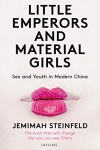 Little Emperors and Material Girls: Sex and Youth in Modern China. Jemimah Steinfeld. I.B.Tauris. 2015.
Little Emperors and Material Girls: Sex and Youth in Modern China. Jemimah Steinfeld. I.B.Tauris. 2015.
This book discusses the sexual behaviour of young women in Beijing and Shanghai, attempting to draw parallels to the West. In order to deal with the lack of official statistics, Jemimah Steinfeld, who worked in China as a journalist for many years, relies on interviews and personal observations. Whilst compulsively readable and entertaining, the book falls short of producing an entirely authoritative text, writes Isabel López Ruiz.
 How to Write a Thesis. Umberto Eco. MIT Press. March 2015.
How to Write a Thesis. Umberto Eco. MIT Press. March 2015.
Now in its twenty-third edition in Italy and translated into seventeen languages, this book has become a classic. This is its first, long overdue publication in English. Vanessa Longden thinks that in addition to its witty one-liners, Umberto Eco’s text contains the bare bones on which to build research.
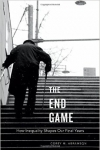 The End Game: How Inequality Shapes Our Final Years. Corey M. Abramson. Harvard University Press. 2015.
The End Game: How Inequality Shapes Our Final Years. Corey M. Abramson. Harvard University Press. 2015.
Corey Abramson’s book takes readers on a journey through geriatric inequality to show how on the west coast of the US the supposed golden years of post-employment for many individuals is an illusion. Through this book, one learns how, in reality, retirement is a corrosive quotidian struggle for body and soul, writes Michael Warren.
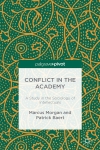 Conflict in the Academy: A Study in the Sociology of Intellectuals. Marcus Morgan and Patrick Baert. Palgrave Macmillan. 2015.
Conflict in the Academy: A Study in the Sociology of Intellectuals. Marcus Morgan and Patrick Baert. Palgrave Macmillan. 2015.
In this book, Marcus Morgan and Patrick Baert yield key insights into the dark underside of academia by exploring the dynamics behind a contentious dispute, known as the ‘MacCabe Affair’, over the faculty appointment of an obscure, young scholar at Cambridge University through the framework of cultural sociology and positioning theory, writes Jeff Roquen.
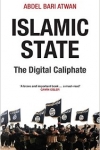 Islamic State: The Digital Caliphate. Abdel Bari Atwan. Saqi Books. 2015.
Islamic State: The Digital Caliphate. Abdel Bari Atwan. Saqi Books. 2015.
This book provides detailed answers to a number of pressing questions: what exactly is ISIS? Where did it come from? Who is behind it? How does it function? What are the reasons for its success? Daniel Falkiner welcomes the rich description and analysis and finds Abdel Bari Atwan does an admirable job of explaining the ways Islamic State exploits 21st-century technology and cultural trends to attract, groom and direct new members across the globe.
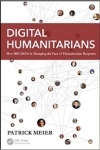 Digital Humanitarians: How Big Data is Changing the Face of Humanitarian Response. Patrick Meier. Taylor & Francis. 2015.
Digital Humanitarians: How Big Data is Changing the Face of Humanitarian Response. Patrick Meier. Taylor & Francis. 2015.
The overflow of information generated during disasters can be as paralysing to humanitarian response as the lack of information. This flash flood of information is often referred to as Big Data, or Big Crisis Data. Making sense of Big Crisis Data is proving to be an impossible challenge for traditional humanitarian organisations, which is why they are turning to Digital Humanitarians. Dimitrinka Atanasova finds the most effective and entertaining aspect of the book is the link between digital humanitarians and #DigitalJedis.
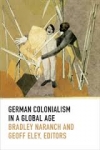 German Colonialism in a Global Age. Bradley Naranch and Geoff Eley (eds). Duke University Press. 2014.
German Colonialism in a Global Age. Bradley Naranch and Geoff Eley (eds). Duke University Press. 2014.
While most studies of European colonialism tend to focus on the British and French empires, German colonialism in the late-nineteenth and early-twentieth centuries had a significant impact not only on German colonies, but also on German society itself. In this book, a number of scholars assess German colonialism during the Bismarckian and Wilhelmine eras (1871–1918), and explore how colonial mentalities and practices shaped later histories during the Nazi era. The book does an admirable job of bringing together diverse approaches on the subject, while inviting the reader to reconsider imperial history and the global interactions that played a fundamental role in shaping it, writes Mahon Murphy.
 The Limits of Neoliberalism: Authority, Sovereignty and the Logic of Competition. William Davies. Sage. 2014.
The Limits of Neoliberalism: Authority, Sovereignty and the Logic of Competition. William Davies. Sage. 2014.
Central to this book is the problem of the ‘critical capacities’ of neoliberalism. What is the relation between economic rationality and political authority? On what grounds does a neoliberal state legitimatise its authority, given that neoliberal critique erodes the substantive political basis for justification? Taras Fedirko finds this book offers poignant analysis, but is less clear when it comes to why neoliberal thinking has managed to win ground in the first place.







